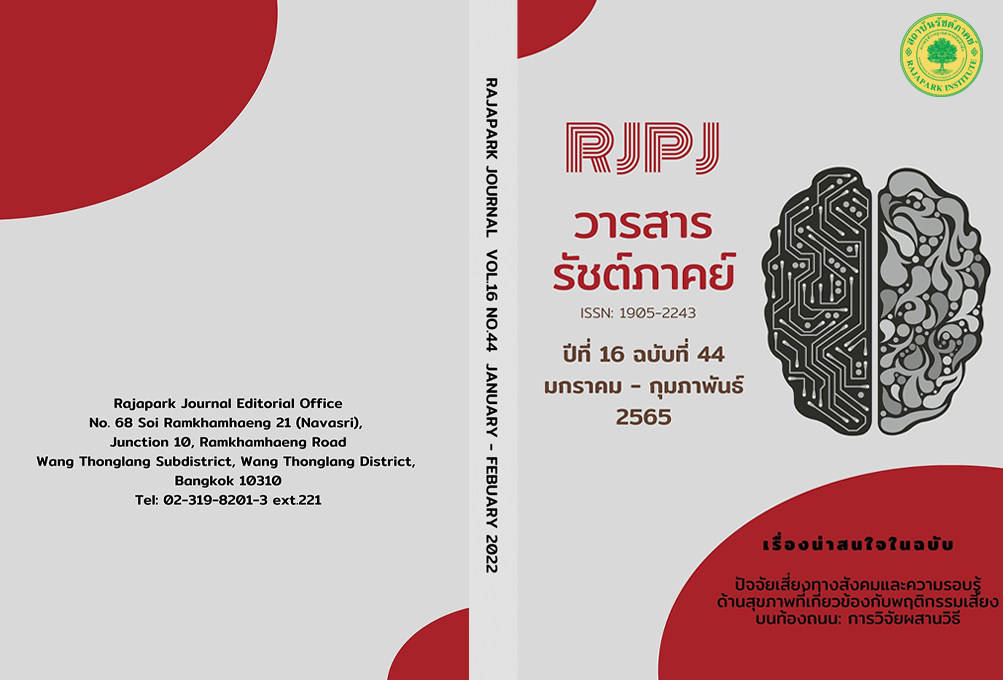The School Management Factors’ Model Affecting Students’ Success in Alternative Schools
Main Article Content
Abstract
The objectives of the study were to 1) study the level of student success in alternative schools; 2) study causal structural relationships of the school management factors’ model affecting students’ success in alternative schools and; 3) analyze the correspondence of the developed causal structural relationships of the school management factors’ model with empirical data collected from 26 chosen alternative schools under OPEC with 26 managers selected through purposive sampling and 393 teachers through multi-stage random sampling. The research instrument for collecting empirical data was a survey with 90 questionnaire items. The reliability of the instrument ranged from 0.86 to 0.925. The descriptive statistics used include Pearson Correlation Coefficient. Structural equation modeling was used to analyze the simulated correspondence of the developed theoretical model with the empirical data. The results of the study were as follows. 1) The overall students’ success in alternative schools was at the highest level. 2) There are 5 factors with a direct impact on the students’ success, they are Leadership Practice, Teacher Pedagogy, Faculty and Staff Management, School Climate Management, and Community Management. In addition, there are 3 more factors with an indirect impact on the students’ success, they are Leadership Practice, Teacher Counselling, and Community Management. The 6 school management factors could represent up to 75 percent of students' success in alternative schools. 3) The analysis of causal structural relationships of the school management factors’ model affecting students’ success in alternative schools and the empirical data from the survey demonstrated that they were in concordance.
Article Details

This work is licensed under a Creative Commons Attribution-NonCommercial-NoDerivatives 4.0 International License.
Views and opinions appearing in the Journal it is the responsibility of the author of the article, and does not constitute the view and responsibility of the editorial team.
References
Aron, L. (2006). An Overview of Alternative Education. Retrieved from https://www.researchgate.net/publication/277176401_An_Overview_of_Alternative_Education
Birioukov-Brant, A. (2018). Defining Success in An Alternative School Setting. In Conference: Annual Meeting of the American Educational Research Association. New York, U.S.A.
Bland, P., Church, E., Neill, S., & Terry, P. (2008). Lessons from Successful Alternative Education: A Guide for Secondary School Reform. Eastern Education Journal, 37(1), 29-42.
Brown, M. M. (2019). Understanding Alternative Education Student Self-Efficacy Related to Experiential and Organizational Factors(Doctor of Educational). Rowan University.
Emmanouil, K., MA, A. O., & Paraskevi-Ioanna, L. (2014). The Impact of Leadership on Teachers’ Effectiveness. International Journal of Humanities and Social Science, 4, 7(1), 34-39.
Hemmer, L., Madsen, J., & Torres, M. S. (2013). Critical Analysis of Accountability Policy in Alternative Schools: Implications for School Leaders. Journal of Educational Administration, 51(5), 655-679. DOI:10.1108/JEA-01-2012-0002
Herndon, J. S., & Bembenutty, H. (2014). In-school and Social Factors Influencing Learning Among Students Enrolled in a Disciplinary Alternative School. Learning and Individual Differences, 35, 49–55. https://doi.org/10.1016/j.lindif.2014.07.007
Herndon, J. S., & Bembenutty, H. (2017). Self-regulation of Learning and Performance Among Students Enrolled in a Disciplinary Alternative School. Personality and Individual Differences, 104, 266-271. https://doi.org/10.1016/j.paid.2016.08.027
Hlady, K. (2013). Alternative Education & 21st Century Learning. Retrieved from https://www.academia.edu/3508098/Alternative_Education_and_21st_Century_Learning
Kaewdang, R. (2001). Educational Quality Assurance: Everyone Can Do. Bangkok: Watana Panich.
Office of the National Economic and Social Development Council. (2017). 12th National Development Plan (2017 - 2021). Bangkok: Author.
Office of The Permanent Secretary Ministry of Education. (2016). The 12th Education Development Plan of the Ministry of Education B.E. 2560 – 2564 (2017-2021). Bangkok: Author.
Poole, J. L. (2016). Characteristics of Effective Alternative Schools in Georgia: Leaders’ Perceptions(Doctor of Education in Educational Leadership). Georgia Southern University.
Tierney, G. (2014). Defining Success in an Alternative High School: Resources for the Reframing of Education. Boulder, CO: International Society of the Learning Sciences, 1, 543-550.
Valeeva, R. A., & Kasimova, R. S. (2015). Alternative Educational System Sudbury Valley as a Model for Reforming School. Procedia - Social and Behavioral Sciences, 182, 274-278.
Valeeva, R. A., Vafina, D. I., & Bulatbaeva, A. (2016). Alternative education: Comparative study of the American, Russian and Kazakhstan experience. International Electronic Journal of Mathematics Education, 11(1), 317-325.
UNESCO. (2021). Education for Sustainable Development. Retrieved from https://en.unesco.org/themes/education-sustainable-development#:~:text=UNESCO%20aims%20to%20 improve%20access,behaviours%20needed%20for%20sustainable%20development
Uthaiwat, S., Surakitbowon, S., & Prasantree, T. (2011). The Relationship between Transformational Leadership of School Administrators and the Effectiveness of School-Based Management of Schools under the Offices of Nakhon Phanom Educational Service Area. Nakhon Phanom University Journal. 1(2), 47-53.


